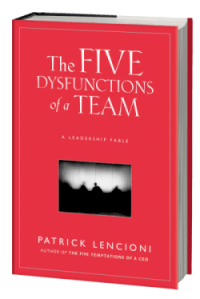Presented as a fable, this book, the Five Dysfunctions of a Team, about building a cohesive team is easily and quickly read. Like all good fables, it delivers a strong message. Readers are introduced to a model that can transform teams. The model for describing why teams sometimes fail is simple: absence of trust, fear of conflict, lack of commitment, avoidance of accountability and inattention to results.
The way through these common difficulties takes work, and the last part of the book provides concrete steps to assist a leader in moving a team to cohesiveness.
The model the CEO in the fable uses while working with her team is incorporated—along with the Everything DiSC model—into a new team assessment and program facilitation (please contact us if you're interested in that tool).
The Five Dysfunctions of a Team has sold over two million copies. Companies, business schools, churches, non-profits, and professional sports teams have made use of concepts in this book.
Additional information
| Category | Books |
|---|---|
| Product Family | Five Behaviors of a Cohesive Team |
| My objective | Make my team cohesive |
| My job / role | HR Professional or Manager, Senior Manager / Leader, Team Manager |
Advantages of Everything DISC
Improve self-awareness.
Constructive change begins with self-knowledge. With a DiSC profile you know better how you react to disagreements, what motivates or stresses you, and how you solve challenges.
Improve team spirit.
In the modern working world, it is within teams that things get done. With a DiSC profile you learn how to better communicate and understand each other in a team
Positivize disputes.
With DiSC profiles, the dispute can be transformed into a positive and productive exercise that helps business move forward with momentum.
Develop stronger sales skills.
With a DiSC profile you improve your sales effectiveness. Understanding and adapting to your customers’ styles is essential to making connections work on a human level.
Manage more effectively.
A leader naturally becomes more effective when he or she understands the preferred work styles and dispositions of team members.
Facilitate, train or accompany without judging.
No one likes to be judged. DiSC profiles level the playing field by giving stakeholders and participants the non-judgmental information they need to learn more effectively.
the customers we work with…


